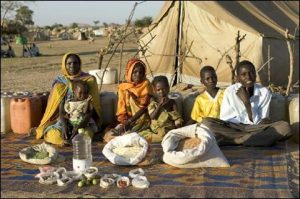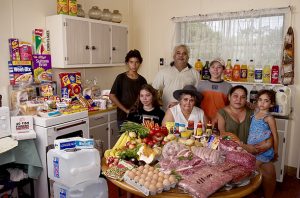After comparing families from Chad and Australia I found that the people in the developing country of Chad are “starving because the policy structures that defended rural livelihoods, and access to resources and markets, and hence entitlements and incomes, are being systematically dismantled by structural adjustment programmes, driven by the World Bank, and by WTO rules imposing trade liberalization” (Shiva). As a result of the lack of infrastructure and communal democracy in Chad and most of Africa, resources are not being allocated equally and responsibly. Trade liberalization has destroyed the economies of nations in Africa because “Policies aimed at making the international price of grains so cheap has hindered (and continues to hinder) progress for many nations and for most of the world’s smallholder farmers” (Caloran 12). Africa can grow a lot of grain, but they rely on trade for many resources including food for their people. With more nations growing grain for extremely low prices, the nations in Africa are unable to keep up and cannot grow themselves enough to be seen as a good deal for the affluent countries to trade with them. “The only way to protect incomes and entitlements in poor countries is to bring back controls on imports” (Shiva).
The major differences in the food systems of Australia and Chad include the affluent countries being on the winning side of trade deals while developing countries are struggling to end with a positive outcome from the world market. “Poverty could be very substantially reduced if the richer countries were more welcoming to imports from poorer countries, rather than shutting them out by tariff barriers and other exclusions” (Sen). It is up to more affluent countries to trade with developing countries to grow the world market and support small farmers and economies that need to grow to support their people.


Hungry Planet Gallery, Peter Menzel
